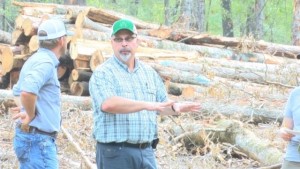Logging Production Fall Off Due to COVID-19 Impacts
June 12th, 2020 by Submitted Arkansas’s economy is more dependent on forests than nearly every other state in the nation. Nearly 60% of our state is forested. Forestry accounts for nearly 5% of the state’s economy, a percentage that is higher than any other state in the U.S. South and third highest in the nation. One of the most critical links in forestry is the logging sector, which moves wood fiber from forests to sawmills and paper mills. The majority of logging contractors are small, family-owned businesses with less than 20 employees. But these small businesses have substantial financial costs, as the equipment required to run a single logging operation often will cost in excess of $3 million dollars. That’s a lot of money for a small business investment, and for logging equipment, it is an investment that is repeated every few years. This places a huge financial burden on logging firms; they must produce timber consistently throughout the year to stay financially healthy. In the first months of 2020, logging production was increasing as the general economy was growing and demand for housing was projected to have one of the strongest years since 2006.
Arkansas’s economy is more dependent on forests than nearly every other state in the nation. Nearly 60% of our state is forested. Forestry accounts for nearly 5% of the state’s economy, a percentage that is higher than any other state in the U.S. South and third highest in the nation. One of the most critical links in forestry is the logging sector, which moves wood fiber from forests to sawmills and paper mills. The majority of logging contractors are small, family-owned businesses with less than 20 employees. But these small businesses have substantial financial costs, as the equipment required to run a single logging operation often will cost in excess of $3 million dollars. That’s a lot of money for a small business investment, and for logging equipment, it is an investment that is repeated every few years. This places a huge financial burden on logging firms; they must produce timber consistently throughout the year to stay financially healthy. In the first months of 2020, logging production was increasing as the general economy was growing and demand for housing was projected to have one of the strongest years since 2006.
But in Arkansas, in March and April of 2020, timber production fell off 480,000 tons, according to statistics reported by the Arkansas Agriculture Department’s Forestry Division. This represents a decline of 15% from the March and April 2019 timber production totals. Most indications, pre-COVID-19, were that timber production should have been increasing in the state. So, it is very possible that this decline in timber production is the result of COVID-19. Should this reduction in timber harvests continue it could have a crushing impact on Arkansas’s logging industry. With a 15% reduction in timber production on an annual level, as many as 650 loggers could be out of work, and $58 million dollars in logs would not be delivered to Arkansas sawmills and paper mills. The total effect on rural areas of the state would be more than 1,100 jobs and 69 million dollars gone from the state’s economy.
This would be crippling to an industry that has fought its way back from the great recession of 2009. Logging firms are small businesses with huge capital start-up costs. And that expensive logging equipment is high-tech; loggers are highly trained and have very specialized skills relating to harvesting and transporting timber. Replacing loggers who leave the industry is difficult. A temporary decline in timber production today due to COVID-19 will likely have long-term impacts on all the forest industries of the state, and the rural economies that depend upon them. The longer the demand for logs is depressed by COVID-19, the more precarious the situation becomes for loggers across the state.
By Matthew Pelkki, Professor and Clippert Endowed Chair of Forestry, College of Forestry, Agriculture, and Natural Resources, University of Arkansas at Monticello
For more information you can contact:
Matthew Pelkki, Professor and Clippert Endowed Chair of Forestry, College of Forestry, Agriculture, and Natural Resources, University of Arkansas at Monticello
(870) 723-3779
Les Reid, owner, Reidland’s LLC Forestry and Timberland, 3722 Hwy 35 West Wilmar, AR 71675 (870) 224-5388(Home) (870) 224-5388(Business)
About the College of Forestry, Agriculture and Natural Resources and the Arkansas Forest Resources Center
The College of Forestry, Agriculture and Natural Resources and the Arkansas Forest Resources Center, a University of Arkansas System Center of Excellence, bring together interdisciplinary expertise through a partnership between the University of Arkansas at Monticello and the University of Arkansas System Division of Agriculture.
The College and Center are headquartered at the University of Arkansas at Monticello campus, but their programs range statewide with the mission of developing and delivering teaching, research and extension programs that enhance and ensure the sustainability and productivity of forest-based natural resources and agricultural systems. Academic programs are delivered by the College of Forestry, Agriculture and Natural Resources through the University of Arkansas at Monticello. Through the University of Arkansas System Division of Agriculture, research is administered by the Arkansas Agricultural Experiment Station, and extension and outreach activities are coordinated by the Arkansas Cooperative Extension Service.
The University of Arkansas at Monticello and the University of Arkansas System Division of Agriculture offer all of their programs to all eligible persons without regard to race, color, sex, gender identity, sexual orientation, national origin, religion, age, disability, marital or veteran status, genetic information, or any other legally protected status, and are Affirmative Action/Equal Opportunity Employers.




























































Theyre cutting our deer lease like there’s no tomorrow.